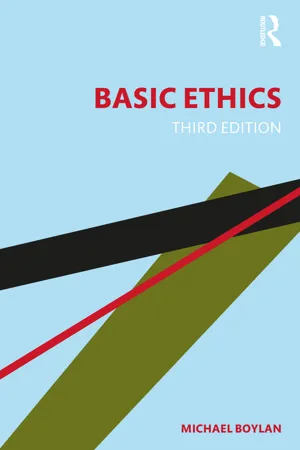
- 246 pages
- English
- ePUB (mobile friendly)
- Available on iOS & Android
Basic Ethics
About this book
Basic Ethics presents for a wide range of students and other interested readers the questions raised in thinking about ethical problems, the answers offered by moral philosophy, and the means to better integrate into both the reader's world and personal life. It takes up what the author calls a "worldview theory," which shows readers how to begin with the values and understanding of the world that they already possess in order to transition from there to new levels of increasing ethical awareness. Updates to the third edition include the more thorough integration of feminist ethics into the principal theoretical traditions, a new chapter on the ethical responsibility to be well informed of current events, expanded coverage of human rights, and additional opportunities on how to use ethical reasoning in thinking about one's own life and about public policy.
Key Features:
- Links personal values to a philosophical treatment of the major ethical theories
- Presents ethics in the context of social/political issues that face our nation and the world
- Challenges the student to react to the presented material through critical exercises that may be used as weekly assignments and can form the basis of class discussion and evaluation.
- Engages the student to think about underlying issues first (in the basic questions) before presenting the most popular solutions (in the basic answers)
- Invites the reader to make up her own mind on how to formulate an ethical theory that will help her in her own life
- Offers a 16-chapter format to fit into most college-semester calendars
- Presents an overall structure that establishes foundational problems in ethical theory in the first section of the book that are variously addressed by the different ethical theories in the second section of the book
- Highlights key terms to help the reader grapple with issues raised (which are reviewed and defined in a final Glossary)
- Includes a final chapter designed to help students comprehend the book in its entirety.
Updates to the Third Edition:
- Highlights new research on human rights and their relevance to ethical thinking and contemporary moral issues
- Integrates feminist ethics into the principal theoretical traditions: virtue ethics, ethical intuitionism, and some versions of deontology
- Provides new coverage of "fake news" and the moral responsibility to be well and accurately informed of current events
- Expands opportunities to use ethical reasoning in thinking about one's own life and about public policy.
Tools to learn more effectively

Saving Books

Keyword Search

Annotating Text

Listen to it instead
Information
Part I
The Basic Questions
Chapter 1
Living in a World of Values
I. Who We Are and What Do We Value?
II. What Is Ethics?
III. The Individual: Metaethics, Normative Ethics, and Applied Ethics
- A particular moral problem arises such as, “What should I do when my pre-natal testing shows that I am carrying a Downs Syndrome baby?”
- To answer (a) implies recourse to a norm by which I can assess my options via-à-vis the “rightness” and “wrongness” of said actions. What is the standard by which we will judge human action as good or bad? How do we know that the standard we have set out is the correct standard?
- To answer this last query, we need to establish a group of principles by which the process of (b) can be critically evaluated itself, in order to ascertain whether the standards in (b) are ones we should adopt for ourselves.
- How do we arrive at the standard?
- What is the range and scope of the standard?
- What formal characteristics should a good standard possess?
Table of contents
- Cover
- Half Title
- Title Page
- Copyright
- Dedication Page
- Contents
- List of Boxes
- Preface
- PART I The Basic Questions
- PART II The Basic Answers
- PART III Putting It All Together
- Glossary
- Index
Frequently asked questions
- Essential is ideal for learners and professionals who enjoy exploring a wide range of subjects. Access the Essential Library with 800,000+ trusted titles and best-sellers across business, personal growth, and the humanities. Includes unlimited reading time and Standard Read Aloud voice.
- Complete: Perfect for advanced learners and researchers needing full, unrestricted access. Unlock 1.4M+ books across hundreds of subjects, including academic and specialized titles. The Complete Plan also includes advanced features like Premium Read Aloud and Research Assistant.
Please note we cannot support devices running on iOS 13 and Android 7 or earlier. Learn more about using the app